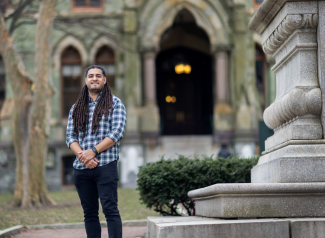
Africana Studies and History Ph.D. candidate Daniel Morales-Armstrong’s research looks at Black Puerto Rican history.
Morales-Armstrong describes sitting at a table inside that pale yellow, 19th-century Spanish neoclassical building, where he says he happened across a labor contract from 1873 for a 17-year-old girl named María Josefa. The document, he says, noted that even though she was free, she was required to work from sunup to sundown every workable day for a period of three years, all for the man who previously enslaved her. Her pay included living at his house, eating at his house, and four pesos a month.
“At the time I didn’t know much about emancipation in Puerto Rico but this was a heartbreaking document for me to find. How was this freedom?” asks Morales-Armstrong. “Aside from a bit of pocket change, it sounded a lot like slavery to me.”
